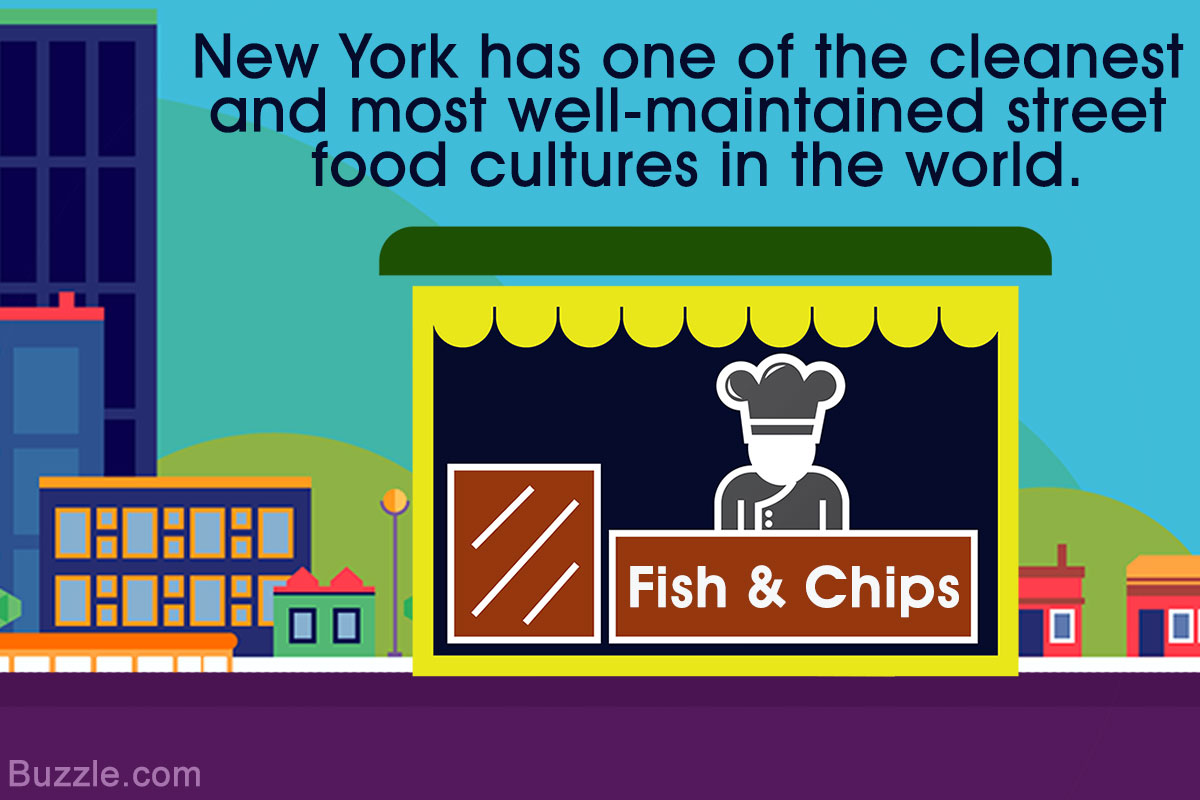
Pampering your taste buds while standing in the middle of vehicular and pedestrian hustle and bustle is a spiritual experience of another kind. We list the top 10 cities around the world to savor the best street food.
Digest That!
Across the globe, an estimated 2.5 billion people consume street food everyday.
From Mexican Churros to Moroccan Kebabs, street food across the globe springs an enticing feeling. The combination of tongue-tingling deliciousness and affordability contributes greatly to the street binging ‘feel’. So does the experience of standing or sitting in the midst of a busy street and watching the world run by, even as you give your taste buds the treat of their lives!
From fancy trucks to shabbily put-together handcarts, from well lined-up Crêpe fillings to disorganized bowls of Kebab garnishes, from Chaat being served in Styrofoam plates to Shawarmas being wrapped in thin wax papers… street food varies a great deal around the world, and so does the taste, quality, and the people who make it. Vacayholics presents a list of the world’s best cities to grab some delicious street food.
Bangkok (Thailand)
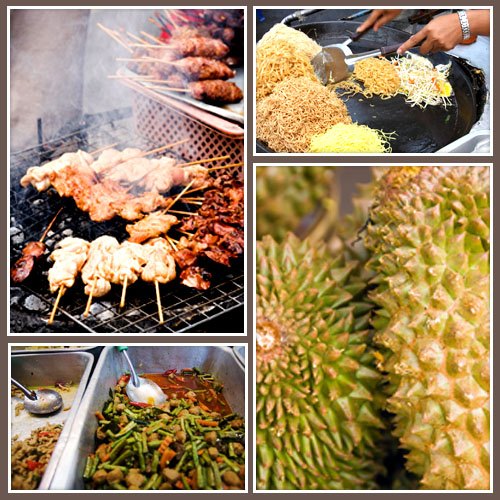
TASTE: The best in the world.
VARIETY: Plenty.
HYGIENE: Nothing to write home about, but arguably better than some of its Asian contemporaries.
What to Try: If street food was a country, Bangkok would be its capital! The must-try street foods in Bangkok include Khao Pad (fried rice), Pad Thai (stir-fried noodles), Pad Ka Prao (stir-fried meat with holy basil leaves), Kai Jeow (spicy thai omelet), and Moo Kratiem Prik Thai (stir-fried pork with garlic). Other varieties tossed up include Roast Chicken with Sticky Rice, Mango Sticky Rice, Sweet Pancakes, and Jim Jum (hot pot). Thai Coconut Ice Cream is legendary and a must-try.
Where to Try: Khaosan Road, Yaowarat Street, Charoen Krung Road, Bang Khun Non, Dao Khanong, and Victory Mount areas are Thai street food sanctuaries. Nang Loen Market and Nakhon Sawan Street also have some stalls. The best time to visit Nang Loen Market is for lunch. Also recommended is a small visit to Pahurat, Bangkok’s Little India enclave, to sample Indian delicacies like Aloo Gobi, Chicken Chilly, Fish Chilly, and Egg Bhurji Masala.
Istanbul (Turkey)
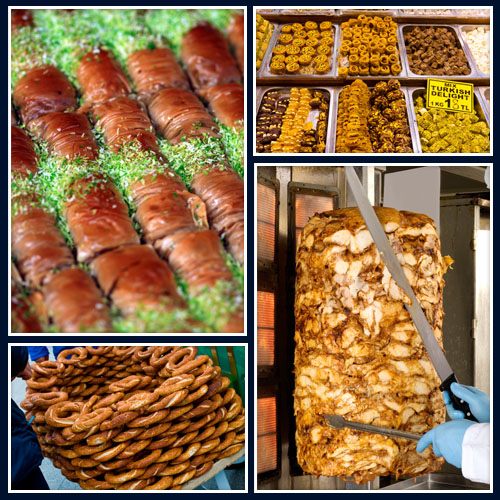
TASTE: Excellent.
VARIETY: Very good.
HYGIENE: Choose where you eat carefully. For every 5 clean stalls, there’s one defaulter.
What to Try: Istanbul is often described as one of the most beautiful cities in the world. And its food matches up to its reputation. Istanbul’s street food has kept its tourists fascinated for decades. If you were allowed only one thing to eat in Istanbul – you should opt for Kumpir (baked potato stuffed with olives, jalapenos, tomatoes, sausages, peppers, pickles, onions, tomatoes, lettuce, cucumbers, and hold your breath … POTATO SALAD on top of the baked potato!). Other favorites on Istanbul’s streets are Çiğ Köfte, Börek, and Lahmajun. For a seafood lover, Istanbul has Midye Dolma on its carts – rice, raisins and herb/spice stuffed mussels. And not to forget the iconic Istanbul street foods Döner Kebab and Baklava.
Where to Try: First and foremost, drop by Kızılkayalar’s located on Taksim Square. The wet hamburger here is legendary. İstiklal Avenue has some food stalls serving a variety of Turkish street foods. For some delicious Döner, check out the Küçük Pazarı area.
New York (U.S.A)
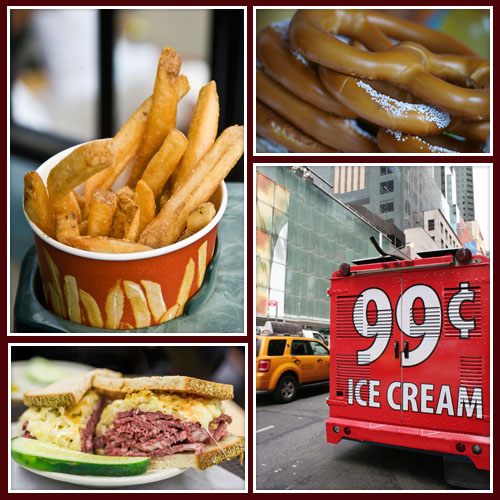
TASTE: Classically American with a sprinkling of global food.
VARIETY: Obnoxiously vast.
HYGIENE: One of the cleanest and most well-maintained street food culture in the world.
What to Try: New York’s street carts and food trucks have contributed immensely to the city’s cultural and financial development. In New York, you are a king when you are on the streets! A variety of classic NY food like Hot dogs, Pretzels, Donuts, Tacos, Corn on the Cob, etc. are at your disposal. In recent years, even gourmet trucks offering BBQ Ribs, Gelato, Curries, Biryanis, and Afghan Kebabs have sprung up, giving NY’s street food scene a welcome diversity.
Where to Try: A New York Hot dog or Pretzel can be found at every 2 blocks. Most of them are good. For some lip-smacking BBQ, try Daisy May’s Truck on the 50th between 6th and 7th Avenue, or Korilla Korean BBQ (can be followed on Twitter for location updates). New York’s best street-binging spots though, remain Brooklyn (pizzas and hot dogs), Jackson Heights (South Asian curries), and Gramercy Park (anything… and everything!). 5th and 6th Avenues, have, in recent years, developed lots of fancy street-eating options such as Cupcakes, Artisan Tea and Coffee carts, and Bagels! Across the streets lining Central Park, carts and stands abound.
Marrakesh (Morocco)
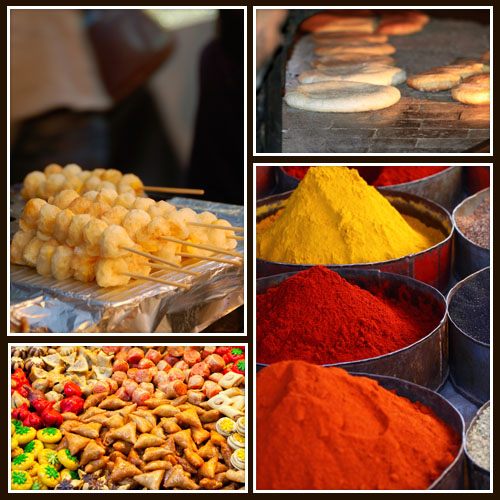
TASTE: Perfect Mediterranean experience.
VARIETY: Within Mediterranean scope, plenty.
HYGIENE: Neither here, nor there.
What to Try: Much like Inception, Marrakesh is a million worlds rolled into one. From the yelling and screaming of merchants in its spice markets to artisan craft vendors stumbling over each other to coax you into buying stuff, to its tranquil corner streets that line old-style residential establishments, Marrakesh is a chaotic dream. Morocco’s version of slow-roasted lamb, Méchoui is a classic. So is Marrakesh local classic – Fried Eggplant. A common thread is couscous; many vendors sell a variety of couscous-based dishes. A traditional classic, although a risqué adventure, is Sheep Head. If you are the one with an experimental palette, do give it a try. Last but not the least, how can you be in the Middle East and not give Kebabs a try. Mandatory!
Where to Try: What is the city’s main business and traffic center during daytime, turns into a food haven post sunset. In Djemaa el-Fna, about a 100-odd food vendors set up their stalls under the bright night sky with neon-lit boards and signs. The square is an illustrative demonstration of Morocco’s Myriad eats. Meanwhile, once your stomach is full and you are an antacid down, take time out to drop by the Spice Market to grab inexpensive, fresh, and fragrant spices – easily some of the purest and finest in the world! If not to buy, just visit the place to view the well-organized barrels and sacs of colorful and aromatic spices, with vibrantly-colorful placards indicating their names and prices.
Ho Chi Minh City (Vietnam)
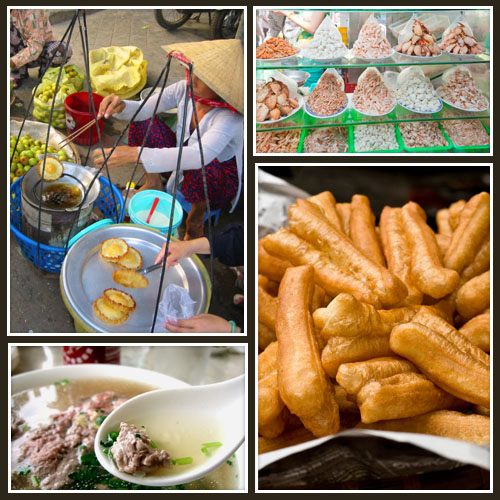
TASTE: Superb. Stay away from faux-authentic food claimants though.
VARIETY: Stays put to Vietnamese and other Far-Eastern foods.
HYGIENE: Questionable.
What to Try: Formerly called Saigon, Ho Chi Minh’s street food character has sprung from the fact that, few years post the Vietnam War, not many could afford fancy food. To add to it, infrastructural development was so stagnant then, that having restaurants or cafés was practically impossible for the immediate next few years. This gave rise to a variety of traditional, quick, affordable, but filling street foods, such as Pho. Easily the most iconic dish world over, Pho is also Vietnam’s national dish. Snails, Scallops, Mussels, and Prawns abound in most Vietnamese street dishes. Hotpots (Vegetarian, Seafood, Beef) are a favorite too! Other traditional street delights are Coconut Rice Cakes topped with Shrimp or Pork, Rice Crêpes filled with Minced Pork and Bean Sprouts and Goi Du Du Kho Bo (green papaya salad).
Where to Try: It’s hard to put a finger on one neighborhood or street and say, this one’s the best. Pretty much all of Saigon is lined with plenty of delicious street food, and most of it is decent. For extraordinary crowd favorites, ask around. Talk to people. Spot the stalls with the most people buzzing around it. That’s your clue.
Palermo (Italy)
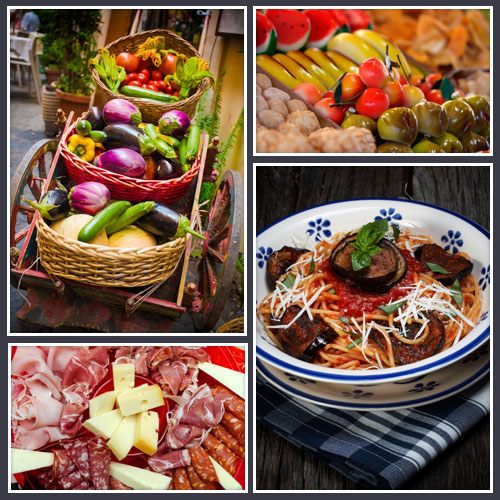
TASTE: If Sicilian food is your religion, Palermo is your Mecca.
VARIETY: Limited to Sicilian varieties.
HYGIENE: Excellent.
What to Try: While street food is the domain of Asian countries, some cities such as NY, Paris and London make their mark among them. But an underrated and rather unknown entity in that list is Palermo. It stands between Europe and Africa, and is only a stone’s throw away from Asia, which makes it, literally, a melting pot of food cultures. Some of Palermo’s street classics include Pane Panelle (chickpea balls), Pani Ca’ Meusa (bread with veal spleen), Panino con Salsiccia (Sicilian style hot dog sandwich), and Crocchè (puff balls with potato filling). Yes, since it’s Sicily, Sicilian style pizza stalls can be found in abundance too!
Where to Try: Beach visits (specially to the ones lining the Via Messina Marine) are a must for the Pollance (simple boiled corn). Drop by the Capo Market to find men with wicker baskets. They sell what is called the Frittola (a heavenly meat sandwich). The areas surrounding Teatro Politeama and Borgo Vecchio also own a vibrant street food scene. Giardino Inglese houses some stalls and carts that serve Gelato and Cremolose in a variety of flavors!
Rio de Janeiro (Brazil)
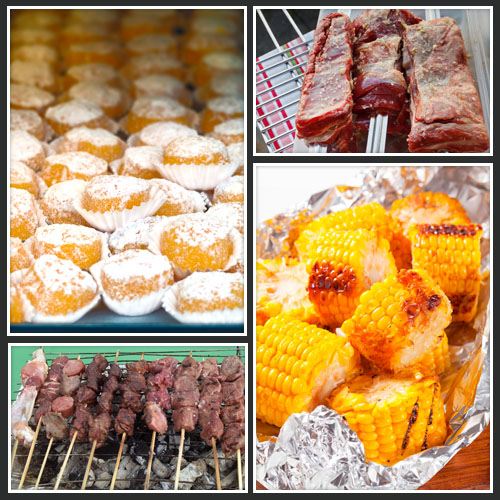
TASTE: Trademark Brazil.
VARIETY: Decent, but brace yourself for a few surprises.
HYGIENE: Horrific. Laws are in place and the situation is slowly improving.
What to Try: Rio is a bit like Saigon and Bangkok. Most of its foods have sprung from the aspect of affordability, but have questionable hygiene. It’s their taste that rolls the dice in their favor. Numerous street stands sell some of the finest Brazilian foods. Pão de Queijo (yucca flour and cheese dumplings), Espetinhos (BBQ grilled sausages), and Tapioca Pancakes (with traditional coconut, milk and sugar filling) are the ones to feast on.
Where to Try: The beach shacks are the best places to dig into Rio de Janeiro’s street food. In fact, the Copacabana Beach boardwalk has 24-hour stalls. Quite a few stalls also crowd the Carioca Metro Station. Traditional Brazilian street snacks can be commonly found around the old Rio city.
Paris (France)
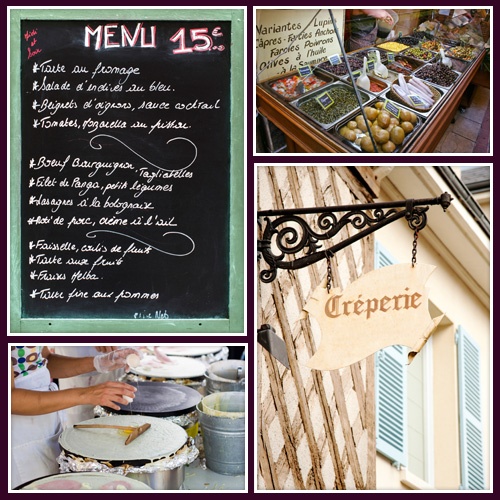
TASTE: Exemplary Parisian food. Don’t expect to find nouvelle French menu items off street carts though.
VARIETY: What variety? Go for the crêpes. Stay for the crêpes.
HYGIENE: Hygiene check is in place, but stale ingredients may make their way in sometimes.
What to Try: Yes, ideally Paris is all about hedonistic and epicurean restaurants, and tarrying but sanguine coffee shops. The Crêpes sold at crêpe stations and crêpe wagons make it happen for Paris. It is hard to make it to a best street food cities list on the back of just one item. But Paris makes it here solely on the power of its Crêpes. The thin pancakes filled with fillings of your choice are a gastronomical delight! The choice of fillings is exhaustive – from Nutella to bananas, to berries, to preserves, to ricotta, to even ham and cheese. Crêpes are God-sent, and Paris is your heaven.
Where to Try: Crêpes are the Paris equivalent of New York’s hot dog. They are everywhere. You won’t walk a mile without coming across some crêpe stall. Most of them are good. Keep an eye out for old/stale ingredients, and stay away from them. Paris has some Panini and Sandwich stalls too, and the same rule applies to them. As the city’s cosmopolitan culture has grown, it has started developing a more multi-ethnic street food scene. Curry wagons, Kebab stalls, and Asian Noodle stalls can be found in select places. Around touristy areas like the Eiffel Tower, decent American street food like hamburgers and hot dogs are sold.
Hong Kong (China)
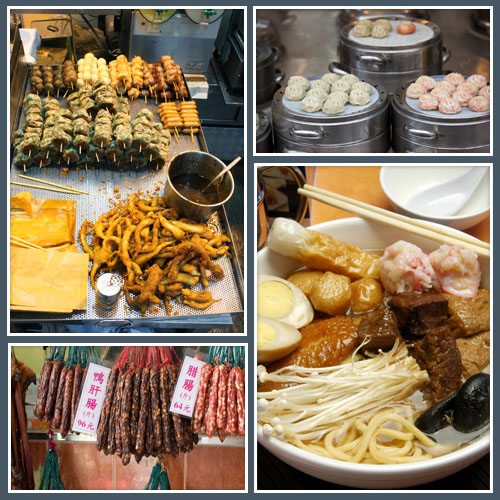
TASTE: Undoubtedly fine.
VARIETY: Limited to Oriental binge-bits.
HYGIENE: Depends on what neighborhood you are in.
What to Try: With a bustling cosmopolitan scene, Hong Kong’s street food scene has mastered everything from Dumplings to Curries to Burgers and Kebabs. About 50 odd trucks dot the city, and a few areas have a large density of makeshift stalls and carts. Of course, Chinese fare is eaten the most. Egg Tarts and Snake Soup are hot favorites, while Dim Sums can be found on virtually every third stall. Curried Fish Balls, Fried Noodles, BBQ Pork Buns, and Tofu Skewers attract a lot of international crowd too.
Where to Try: Graham Street and Haiphong Road house plenty of Dai Pai Dongs, and most of them dish decently delicious food too. Temple Street Night Market and Ladies Market are fantastic places to find Hong Kong’s best street food. Hau Fook Street offers a lot of Cantonese as well as traditional Chinese fare, but if possible take a guide or a local along; most vendors in the area don’t speak English.
London (England)
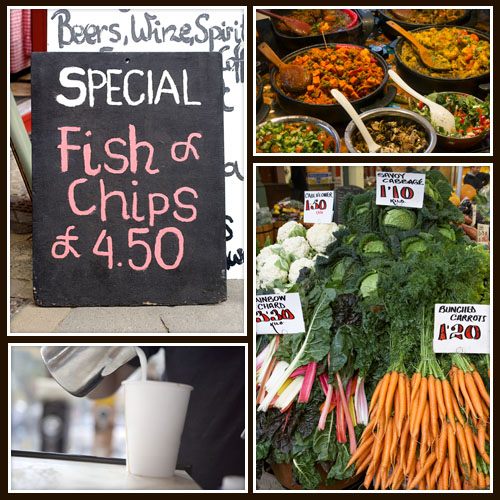
TASTE: Hardcore Brit bombs with a smattering of curry cuisine.
VARIETY: Plenty, but stick to classic British street items like fish and chips, sandwiches, Anglo-Indian cuisine, etc.
HYGIENE: All laws in place and well implemented, barring an exception or two, expect a smooth and clean ride.
What to Try: Pulled Pork Sarnies, Sweet Churros, Tikka Masala Rolls, and what not. London’s stiff upper lip does prefer the tang of street snacks once in a while. London has plenty of street food from around the world. Pies, Paella, Kimchi, Crêpes, Thin-crust Pizzas, Burgers, Kebab Rolls, Curry and Rice, Tandoori Chicken, is only where London’s street food scene begins, and goes on to infinity! London’s hero though remains Fish and Chips. Whether it’s a tiny shack on some blustery riverside promenade, or a roadside vending café with 2 tables and 4 chairs, you are never too far away from good ol’ Fish and Chips. Traditionally served with a lemon wedge and tartar sauce, Fish and Chips is a slice of Britain unto itself.
Where to Try: Quite a few carts and wagons make excellent Fish and Chips. Alternatively, drop into one of those cafés with an outside seating arrangement encircling the lamp-post. Take in London’s street movements, even as you bite into that crunchy beer-battered piece of awesomeness! Do not worry about the quality and taste; in London, 99.9% of ’em get their Fish and Chips right. London’s Southall is India wrapped into one neighborhood. Devour the Chicken Tikka Masala and Naan, along with Kebabs straight out of the oven, and finish off the meal with a visit to a Paan Store and order Meetha Paan, an Indian after-meal palate cleanser and mouth freshener. London has an astonishingly high number of sandwich shops on its street corners, prominently in Berwick Street Market, Maltby Street Market, and Borough Market. South American Chorizo Sandwiches, Indian Wraps, Vietnamese Banh Mi, etc., are a delight to the taste buds.
It is hard to put a finger on what makes street food click… and on such a large scale. The elitist of elites have known to enjoy a sizzling hot dog off a street cart, while the not-so-rich ones actually survive on it. It certainly has a universal appeal – across social strata, across age, across gender, across religion, and with some foods even across international boundaries. Comfort is also a factor. What cannot be carried along or wrapped in a paper or tucked in a box is not street food. Street food is comfort food, that can be savored without fancy Chinaware or forks and knives. The bottom line is, any city has to offer scrumptious, filling, easy-to-carry/hold, quick-to-make, and affordable food to claim to be a street food haven.



